🧵 View Thread
🧵 Thread (29 tweets)

the pop culture conception of magic feels mostly narrowly tied to fixed spells with fixed combat-relevant effects. spells as guns or superpowers. the etymologies here suggest an older, naturalistic, integrated conception of magic as something people do in their ordinary lives https://t.co/Nn14pziEM8

it'd be interesting to trace the pop culture conception of magic to its roots. my main sources of exposure to concepts of magic growing up were fantasy video games, especially final fantasy, and fantasy novels, especially harry potter. let's trace 'em back @visakanv-style

the original final fantasy was inspired by dragon quest, which in turn was inspired by CRPGs like wizardry and ultima (click through, btw, if you want to read a really interesting set of reviews of almost the entire final fantasy series) https://t.co/KDadnGEnWl https://t.co/UdxaW9XjrE


CRPGs like wizardry and ultima were in turn inspired by dungeons & dragons and tolkien (which was also an influence on D&D). probably nearly every single video game's conception of magic traces back to D&D if i had to guess https://t.co/Hg0pdzY6CL https://t.co/B29WBXHk6Y
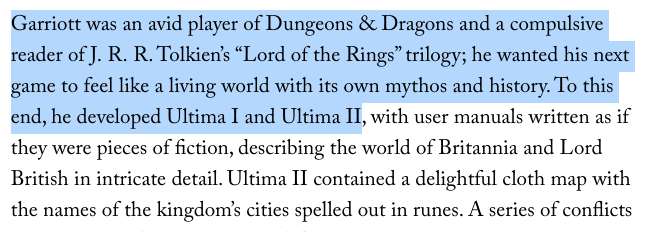

D&D grew mechanically out of medieval miniature wargaming (combat!) and narratively out of fantasy as a genre. tolkien was a big influence but more pulpy stuff also seems to have been important. not familiar with most of these authors but the lovecraft makes sense https://t.co/ItxuD5Ek6t
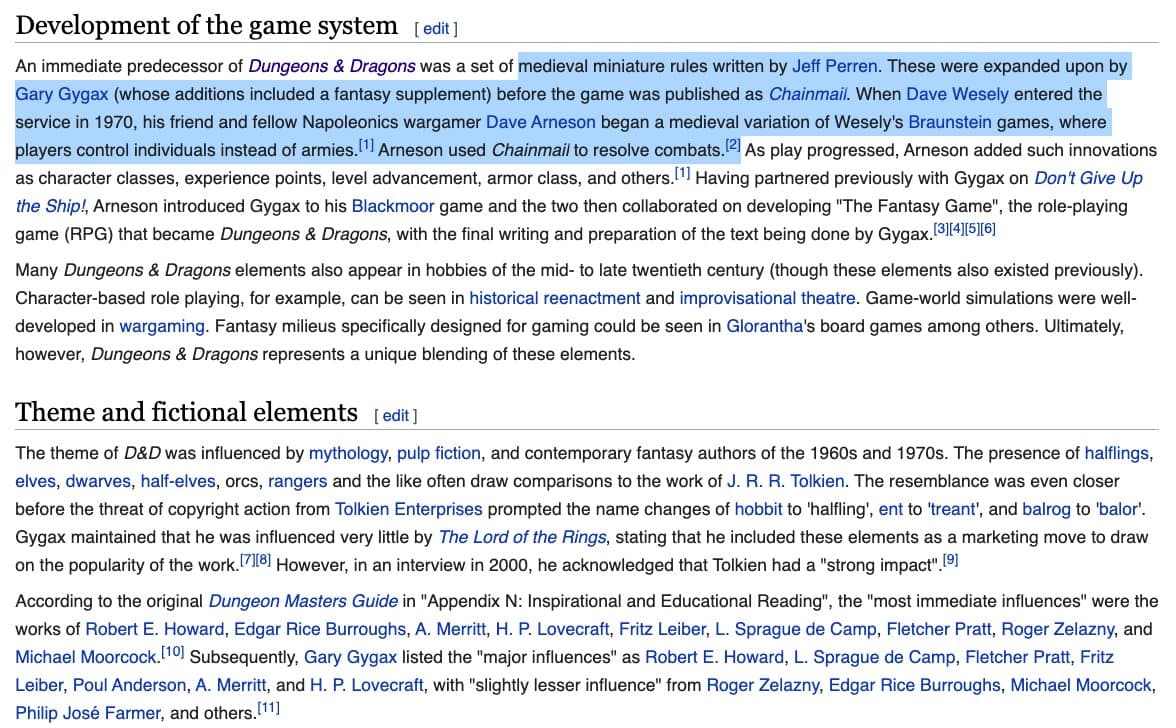

picking the first guy to double-click on. oh shit, conan the barbarian! "mixing elements of fantasy, horror, and mythology" conan the barbarian, of course, also has a strong combat orientation. funny that everything i know about him is through parodies https://t.co/pIpLTpG1iX https://t.co/zzHfhIBAWI


this bit is super interesting: robert e. howard grew up in texas and was exposed to a lot of violence growing up and "grew up a lover of all contests of violent, masculine struggle." conan the barbarian was born in the heart of a texan. it all makes sense now https://t.co/wmuhKAyY8z


gonna refocus on D&D and gary gygax b/c i think there's an interesting way D&D serves as a "memetic bottleneck" here. little gary was into LARPing, pulp fiction, and wargames. idk anything about pulp fiction or wargames. let's click on wargames first https://t.co/ZKaBUpRUt3 https://t.co/aKRw59BpKC
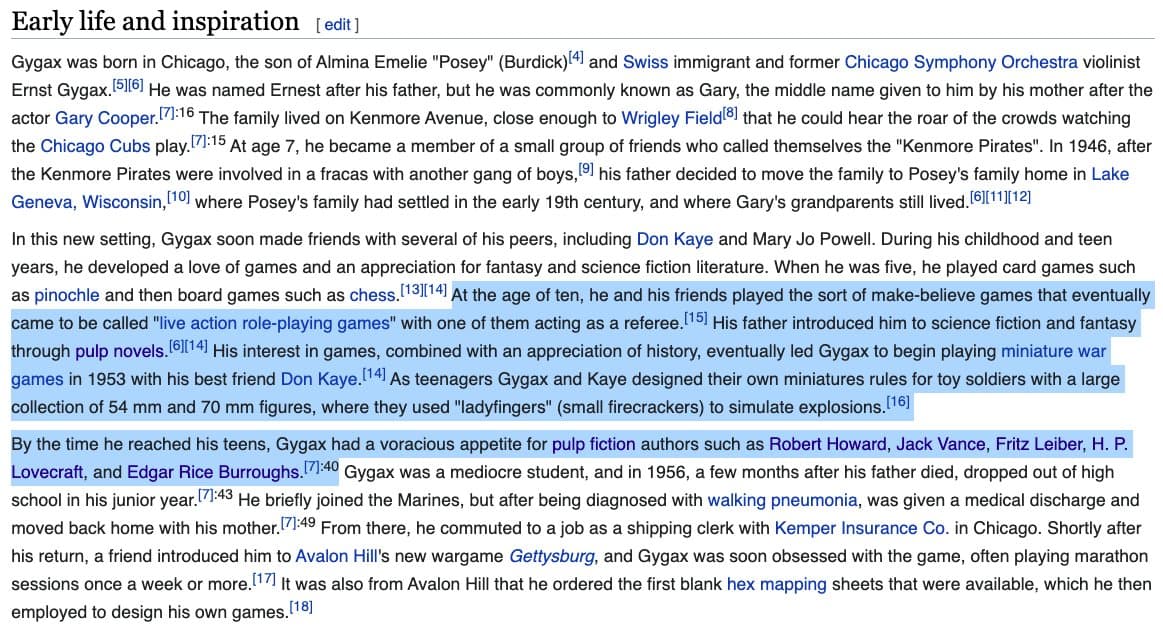

wargaming was invented in prussia and used for military training; attracted attention b/c they beat france in a war in 1870 h.g. wells "developed codified rules for playing with toy soldiers, which he published in a book titled Little Wars." adorable! https://t.co/4P8JrrXUjS https://t.co/1KHOsKLyuz


wow wait okay the full title of the book was "Little Wars: a game for boys from twelve years of age to one hundred and fifty and for that more intelligent sort of girl who likes boys' games and books" bruh now it's less adorable c'mon https://t.co/OuBwZuknnt https://t.co/X4KRFCfAMT
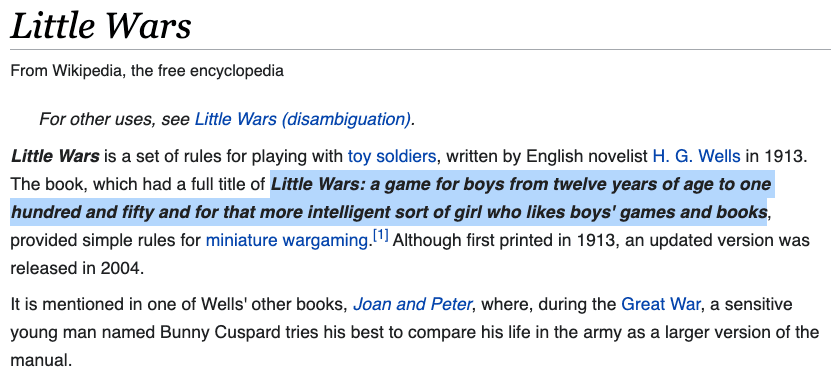

ok now pulp fiction. this bit seems important: "During the economic hardships of the Great Depression, pulps provided affordable content to the masses, and were one of the primary forms of entertainment, along with film and radio." https://t.co/rgVsvILVq0 https://t.co/7AGsASCN3P
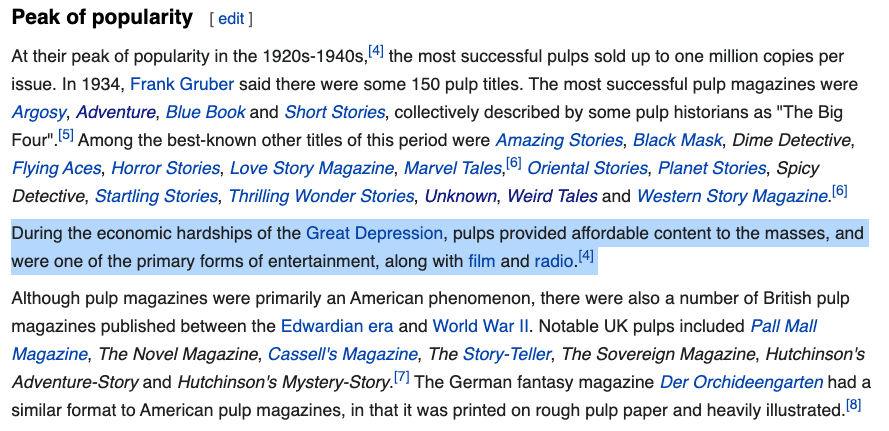

this is starting to feel like a huge topic. here's an incomplete diagram of the influences we've traced so far. i am still mostly drawn to understanding the D&D bottleneck, as the place where pop magic switches tracks from stories to games https://t.co/UShiy5iXwL
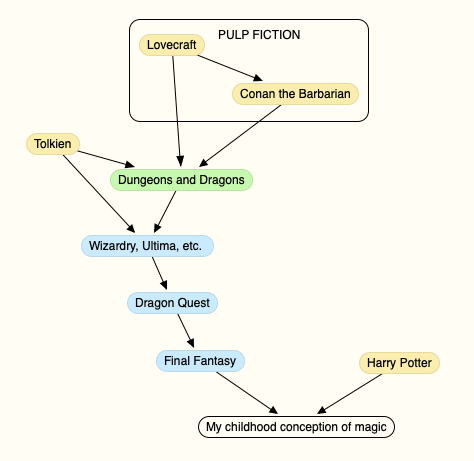

there's something you kill about the nature of magic by forcing it to fit mechanically into a game, tabletop or video or otherwise. the way it's usually done magic becomes something dead you control, rather than something alive you have a relationship to https://t.co/oi9gCKMAr4

surprisingly rowling's conception of magic in harry potter is also mostly "dead," with the exception of whatever harry's mom did to protect him from voldemort, despite the fact that rowling's influences were very literary / mythological; no games, no pulp https://t.co/6NQlVLqS4O https://t.co/8YvtP6JXoW
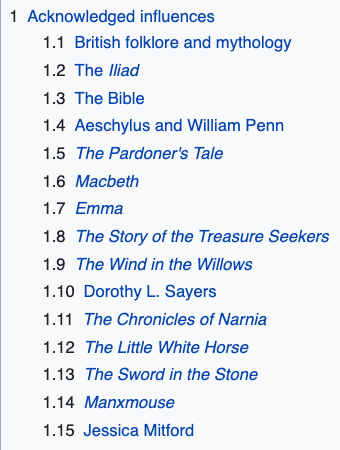

in harry potter a spell is a lever you pull to make a fixed thing happen in the world. you don't have to talk to any spirits or gods. spells can't backfire due to a lack of faith or weakness of heart. where did this come from? did magic work this way in narnia? i'm not familiar

i'm not sure how to track influences for harry potter b/c rowling has apparently said "I haven't got the faintest idea where my ideas come from" so these are guesses even on her part. but sword in the stone makes sense: harry = arthur pendragon, dumbledore = merlin https://t.co/rfxWhbp7io


narnia also makes sense - king's cross and platform 9 3/4 and the wardrobe, yes, yes, naturally. all of rowling's influences seem very like... prim and proper, it's an interesting contrast to the pulpy stuff we were looking at earlier. extremely british https://t.co/VRIIoo0ttY


tracing narnia's influences feels like a big project so i'm gonna stop here for now. here's the updated influence diagram, still leaving out a bunch of stuff for readability https://t.co/ioh6GZhpNr
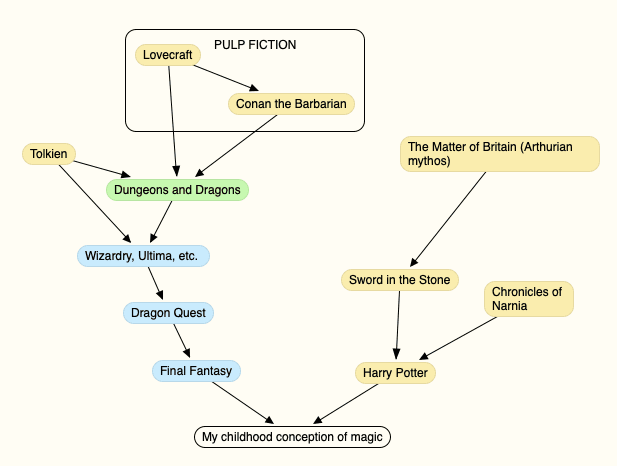

whoa hmm very interesting thread in the QTs https://t.co/M3N8SiWB6G

@QiaochuYuan Tolkien and CS Lewis were good friends! they had an oxford literary group together https://t.co/rzY7uLL9ge

@QiaochuYuan also i dont think standard modern metaphysics allows for magic that isnt a tool like, the assumption is that things happen in a repeatable manner, with effects having a clear cause such that they can be recreated in controlled circumstances

@QiaochuYuan we dont really know why physics works either im also thinking about the modern thread of gods being subject to physics, as opposed to creating physics so, even given spirits and demons and gods, its not like they serve as *explanation*, because they arent responsible for magic